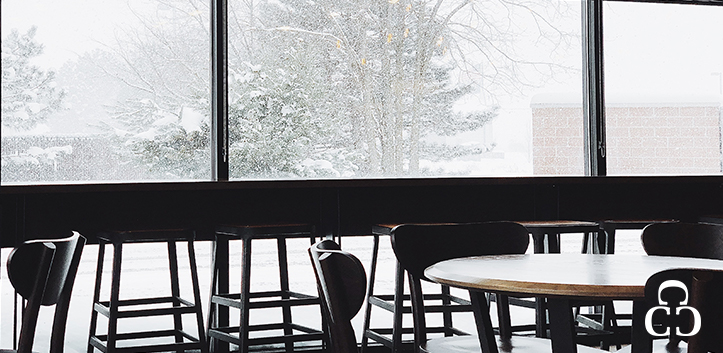
You probably never stopped and noticed how the winter weather affects concrete until you are driving down the road and your car falls into the deepest pothole. Winter can take a harsh toll on your vehicle and the concrete roads. Now that we have you thinking, have you ever stopped to consider how the cold will affect your indoor concrete floors. Concrete is considered a very durable and long-lasting material. It has been used for thousands of years. You can see concrete is used on roads, buildings and floors all over the place. If you happen to have custom concrete floors you will want to consider how the colder weather can affect your indooring floors.
Winter is difficult on the outside concrete surfaces because of the snow, rain, ice and changing temperatures. If the concrete is not properly sealed with performance sealers or deniers and the weather and moisture can cause deterioration and cracks, like crumbling cookie. Unprotected concrete is like a sponge, it will absorb water and moisture into pores and cause irreparable cracking. Plus the freezing temperatures are also not very much help to prevent it from cracking.
The freeze-thaw cycle is when water gets into cracks of a rock, in this example concrete, and it freezes. The water that gets through the cracks and pores will freeze causing it to expand and crack the surface of the concrete. When the water trapped in the concrete’s pores and cracks unfreezes during warmer temperatures, it leaves open cavities. There is not much that can be down to prevent the outside concrete from going through the freeze-thaw cycle.
How to prevent winter damage on your concrete
Before the winter weather comes at full force with snow and ice, ensure your home’s and business’ concrete is prepared. There are precautions you can take to protect your concrete floors from getting significant damaged this winter whether they are indoor or outdoor. You paid good money for your custom concrete floors, so you should protect every amount spend.
We all have concrete floors outside in sidewalks or driveways. One way to prevent any damage from occurring on your sidewalk floors is by not throwing salt. Salt activate the freeze-thaw cycle causing your concrete to expand. Instead use sand. Sand is beneficial because it does not melt the ice and not letting it get into little cracks and joints of your concrete. You will not worry about lawsuits coming your way because using and will not allow slipping. Another simple solution is just keeping the snow off your sidewalks and driveways. This will prevent the snow from building up and freezing causing cracks to your floors.
One significant way you can protect your indoor custom concrete floors is by sealing your indoor concrete floors. Sealing your concrete floors will prevent any water or moisture from getting into the cracks. Contacting a professional to add a densifier and hardener to your concrete is another excellent option to protect your indoor concrete. A hardner will create a chemical reaction on your concrete and penetrate and densifies the upper layer of the concrete for a long life on concrete floors. The hardener will help make your floors water resistance, so you will not have to worry about the water from coming in your floors and damaging your floors.
________________
Custom Concrete Creations is chosen to help facilitate projects because we are the preferred custom concrete floor company, not only in Omaha, but for the greater Midwest region. No project is too big or too small for our team of seasoned experts who use state-of-the-art equipment on each and every project. We help you achieve the look of your dreams and do not consider the job done until you are happy with the results. So give us a call or contact us for your custom concrete needs today!
